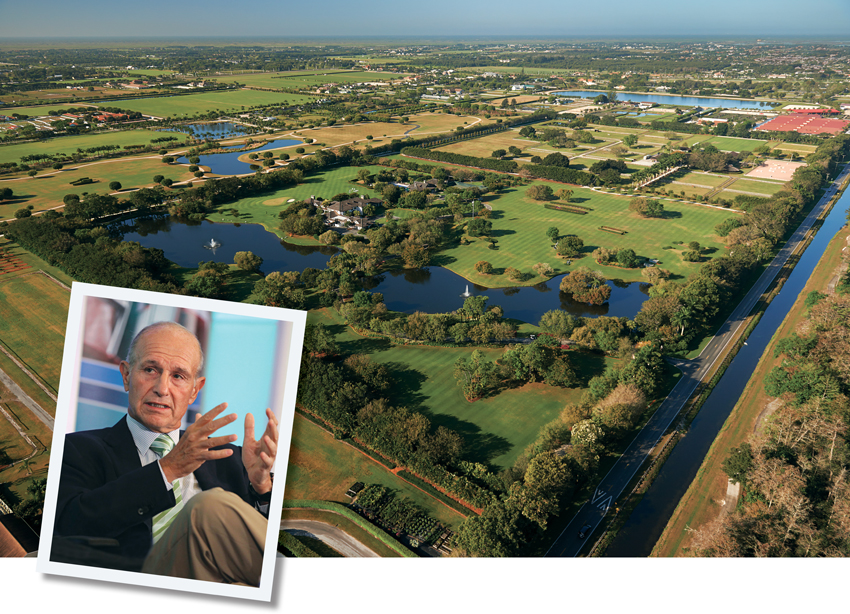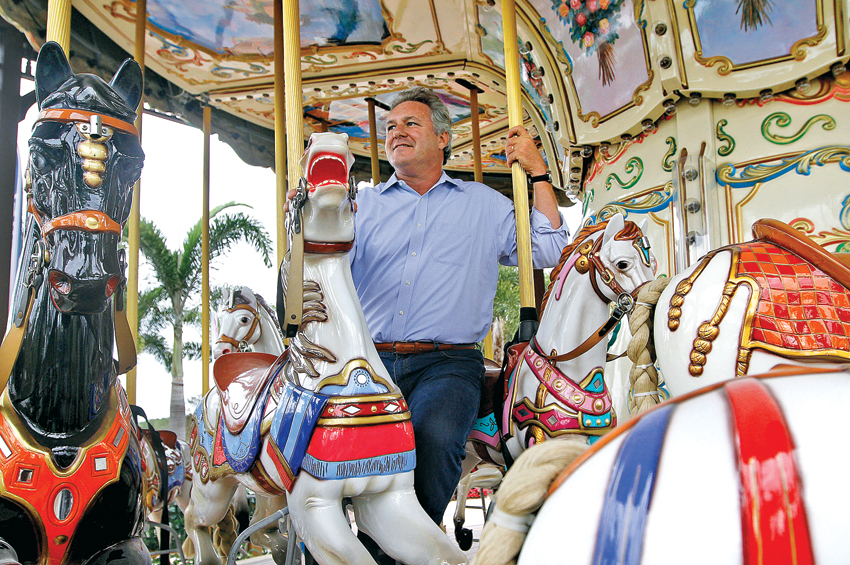Trouble in Wellington for Jeremy Jacobs

JACOBS LAND: Jeremy Jacobs and his 200-acre Wellington, Florida, estate sit at the center of controversy. (All aerial photos by Cameron Davidson, Jacobs photo by Gort Productions/Sport Journal)
The village of Wellington, Florida, is unlike just about anywhere else. The northern part is a typical-enough bedroom community, just west of West Palm Beach. But the southern stretch, officially designated an “equestrian preserve,” is a strange parallel universe where horses rule supreme. Here the super-rich are common—Bill Gates, Athina Onassis, Georgina Bloomberg, and Bruce Springsteen are all regulars. But they get scant attention compared with the horses. Diamond yellow street signs warn of their crossings, and it’s normal to see mounted riders just cantering down the road, on their way to one of the area’s many polo fields or riding rings. The preserve’s anchor is the Palm Beach International Equestrian Center, a sprawling show-jumping complex that’s home to what organizers boast is the largest horse show in existence. Wellington’s population is 57,000, but the Winter Equestrian Festival, as the 12-week competition is called, each year draws 15,000 additional people from the world over.
Horse owners pay a fortune for properties within a few miles of the equestrian center, so that they can easily walk their animals to the grounds. And though the multimillion-dollar horse mansions they build on the lots are called barns, as I learned when I recently visited Wellington, they aren’t the type that Old MacDonald would recognize. “My goal one day,” Village Manager Paul Schofield told me, “is to own a house that’s as nice as some of those barns.” A Spanish Mission Revival–style job on 13 acres near the show grounds—with stalls for 18 horses—is currently listed at $27 million.
The main axis of the preserve is Pierson Road, with the International Equestrian Center sitting at its far western end. Two miles down the road to the east lies Deeridge Farm, the 200-acre estate of Jeremy Jacobs, the notoriously short-tempered and combative billionaire owner of the Boston Bruins. At 73, Jacobs, who is also the chairman and CEO of Delaware North, a Buffalo-based international concessions, hospitality, and gaming conglomerate, no longer rides himself. But he once did, avidly, and his children and grandchildren have followed suit. He bought the first parcel of his compound—the centerpiece of which is a 21,000-square-foot mansion—in 1979, and three generations of his family have dominated the clubby horse sport scene in Wellington ever since.
Deeridge Farm takes its inspiration from the family’s spread in East Aurora, New York, which was designed by Frederick Law Olmsted. But the place feels made for horses as much as people. Gracious riding paths weave their way through the grounds, and a rustic horse barn sits near the front of the estate, set beside a ring for jumping practice. (One of the obstacles is outfitted with Bruins logos.) All told, about 25 horses live on the property, and the family keeps another 15 or so at the International Equestrian Center.
Deeridge Farm has long served as an annual winter refuge for Jacobs. He is known as a difficult man, and this was his soothing paradise—that is, until a wealthy developer from Boston named Mark Bellissimo showed up in town, full of big ideas.
As the residents of Wellington would come to learn, this made Jacobs very angry.

CARNIVAL ATMOSPHERE: Mark Bellissimo, the owner of the Palm Beach International Equestrian Center, has outraged Wellington’s tradition-minded equestrians by installing attractions like this carousel on his show grounds. (Photo by Zuma Press)
Bellissimo, who is 51, grew up in Natick, and attended Andover Academy, Middlebury College, and Harvard Business School. He played hockey in college, and, despite his ritzy résumé, he has the mentality of someone much more likely to square off with an opponent at center ice than to sit prissily atop a horse. Actually, horses didn’t come into his life until the mid-’90s, when he sent his daughters to an equestrian camp near his summer home on Lake Winnipesaukee. Soon his wife was riding, too, and the family began making frequent trips to Wellington. At the time, Bellissimo was the CEO of a sales-force automation company called Brandwise. In 2004, during a merger with a Denver company, he and his wife decided that the time was right for a major change. They sold their home in Weston and moved full time to Wellington. But it was hardly a blind plunge. Bellissimo already had plans.
In those days, the Winter Equestrian Festival was a relatively small affair, held each year, as it is today, at the International Equestrian Center. But back then the riding ring was a simple grass field that would get so torn up by season’s end that it became treacherous for horses. There were no stands for spectators and, really, few permanent facilities of any kind. “They used to have port-a-potties everywhere,” Bellissimo told me.
The late Gene Mische, the founder and majority owner of a company called Stadium Jumping, which operated the festival in those days, was in many ways a visionary. He’d recognized how popular an elite sport like equestrianism could be in a community like Wellington. But he was also a terrible businessman. Fortunately for him, the Jacobses were the second-largest shareholders in the company, and they weren’t particularly concerned about its bottom line (an attitude that anyone who’s ever paid $8 for a beer at the Garden probably wishes the family would apply to the Bruins). “It was an undercapitalized, small venture,” said Lou Jacobs, Jeremy’s son, who serves as an executive at Delaware North and is a former rider himself. “None of us were in it for financial gain. It was something we enjoyed doing for a pastime, as a family.” (Delaware North did not make Jeremy Jacobs available to comment for this story. The company referred me instead to Lou.)
Nevertheless, the festival managed to draw plenty of money to town. In 2005, for instance, it injected an estimated $57 million into the local economy. Bellissimo saw tremendous untapped potential for profit. “There’s a passion here for horse sport,” he told me. “I thought, If you harnessed this passion, and you created a product that was respectful of the people that participate in this sport, you could create a very, very significant business.”
At the center of that business was the International Equestrian Center, where, Bellissimo realized, upscale vendors and advertisers might pay a fortune for access to the wealthy clientele. Better yet, if he owned the land surrounding the main arena, he could increase its value by improving the quality of the equestrian competitions and lengthening the jumping season, both of which would give affluent horse owners an incentive to buy land and barns nearby, driving prices up.
The Jacobs family spent over half a million dollars on Wellington’s municipal elections. “Would I do it all over again?” Lou Jacobs says. “Absolutely.”
Bellissimo moved quickly. In 2006, just after New Year’s, he shocked Wellington by striking a deal with the notoriously difficult developer Glenn Straub to buy the show grounds and the surrounding area for $135 million. In all, he would acquire 500 acres and make plans for an equestrian mecca, complete with an overhauled facility, 350 homes, and 255,000 square feet of commercial space.
But buying the property turned out to be the easy part. Bellissimo had the land, but the festival was still operated by Stadium Jumping, the company owned by Gene Mische and his minority partner, the Jacobs family. The United States Equestrian Federation tightly regulates the dates that different venues can host events, and, in Wellington, the show dates “belonged” to Stadium Jumping. Without those dates, the equestrian center was useless. Bellissimo courted Mische. He made him a partner on the land purchase and, in the process, struck a deal for the dates: In exchange for a profit-sharing arrangement, Mische agreed to a 30-year lease with Bellissimo’s new company, Wellington Equestrian Partners.
The Jacobses were furious. They considered Bellissimo a businessman, not a horseman. “We disagreed about the mission,” Lou Jacobs told me. “He was going to build a clubhouse. He wanted valet parking for horses. It just got to the point where I said, This guy really doesn’t understand the sport. From my view at the outset, it was all about development.”
As minority stakeholders in Mische’s company, the Jacobses were technically powerless to stop the deal. But they weren’t helpless. Mische, it turned out, had used $2.75 million of company money to purchase his house. In July 2006, the Jacobses’ lawyers sent him a letter alleging that he had been treating the company they owned together as “his bank for funds whenever needed.” Mische soon tried to back out of his agreement with Bellissimo.
Bellissimo argued that Mische was bound to their deal and, as each side dug in, the Jacobses and Mische threatened to pack up and find somewhere else to stage the Winter Equestrian Festival. A slew of lawsuits followed. Perhaps feeling shaky about their legal standing, the Jacobses agreed to negotiation and, finally, on November 21, 2007, a settlement was reached. The precise terms were never disclosed, but the agreement was so long and complicated that Bellissimo’s lawyer claimed that he had to sign it more than 1,000 times.
The end result: Bellissimo owned the show dates. He had stared down Jeremy Jacobs and won.

